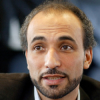Tariq Ramadan

Tariq Ramadan
Tariq Ramadanis a Swiss academic, philosopher and writer. He is the professor of Contemporary Islamic Studies in the Faculty of Oriental Studies at St Antony's College, Oxford and also teaches at the Oxford Faculty of Theology. He is a visiting professor at the Faculty of Islamic Studies, the Université Mundiapolisand several other universities around world. He is also a senior research fellow at Doshisha University. He is the director of the Research Centre of Islamic Legislation and Ethics, based in...
NationalitySwiss
ProfessionWriter
Date of Birth26 August 1962
CountrySwitzerland
We've got to get away from the idea that scholars in the Islamic world can do our thinking for us. We need to start thinking for ourselves.
IS [Islamic State] has played a major role in helping Bashar al-Assad to reposition Syria on the international scene. Now, it is almost impossible to come up with a solution that would exclude him. The political game appears to be very cynical indeed.
Saying that the origin of the Islamic State (IS) is within the Muslim Brotherhood organisation only strengthens IS.
In fact all the Islamists, that is the reformists not the Salafis, now they all say that they want a civil state, a civil state with Islamic reference points. They are not talking about an Islamic state, or sharia in the way this was once understood in the fight against the colonisers, or just afterwards in the 70's, 80's and 90's.
An 'Islamic economy' or 'Islamic finance' doesn't mean anything to me. But I do think that in the multi-polar world, it is time to find new partners, to find a new balance in the economic order. And this could help you to find an alternative way forward.
The suicide bomber who blows up Israeli children cannot transform himself into a martyr. The Palestinian problem is not an Islamic problem.
Emancipation can only come from within; it cannot be dictated by someone else. A law banning the wearing of headscarves changes nothing, except perhaps external appearance. Naturally, Islamic feminism must also include the right to education, to work and the freedom to select one's own husband.
The philosophical connection between the Islamic world and the West is much closer than I thought. Doubt did not begin with Descartes. We have this construction today that the West and Islam are entirely separate worlds. This is wrong.
The discriminations that are found in the Muslim majority countries are more Cultural than Islamic. .... I have always said to the Muslim women, please do not nurture the victim mentality. Stand up for your rights.
I focus on Islamic applied ethics in many fields, and here I am saying that coming back to the Qu'ran and the sunnah as our reference point does not mean that we depend for our ethics on 'Islam as opposed to the others'.
We are not here to adopt Western values, we are here to colonize the U.S. (and Canada) and spread Islamic sharia law Canada has one of the easiest legal systems to penetrate and advance sharia from within...but if that doesn't work, we won't hesitate to use violent jihad.
I have never, so far, in all the studies I have done, met a contradiction between what the human, experimental and natural sciences are telling us and the Islamic rules. In fact, the opposite is true: anything that is coming from the modern sciences is helping me better understand the text. It's not a contradiction. It's a relation.
Saying that I am talking out of both sides of my mouth just proves my very point. Politicians would bypass real social issues by referring to my grandfather, who founded the Muslim Brotherhood, or to my brother, currently chairman of the Islamic Centre in Geneva.
We need to deal with three things that are important: first, we need a very deep reconsideration of how we are dealing with the economy. Second, there must be a very deep reconsideration of our way of life. We cannot simply adopt American-style consumer culture. To Islamize that is to de-Islamize Islam.Thirdly, it is important for us to understand the economy and the environment are common challenges for everyone. This is where the singularity of Islamic principles needs to join the universal values that we share with others.